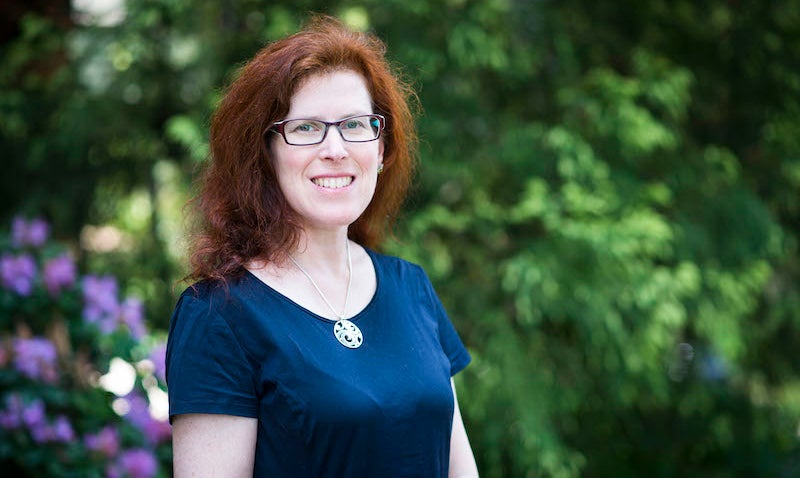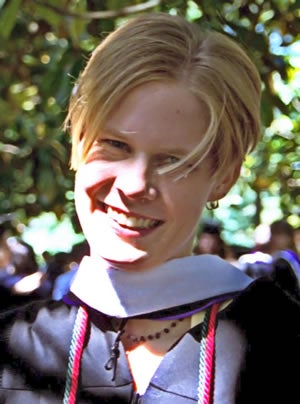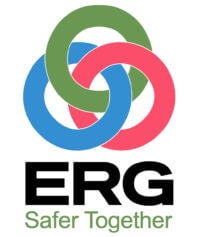Biosafety in Research and Cura Personalis

Posted in GUMC Stories | Tagged biosafety, Center for Global Health Science and Security, Elizabeth R. Griffin Program, global health
(October 24, 2019) — “When they work well, no one knows they’re there.”
That’s how Julie Fischer, PhD, describes programs that protect biomedical scientists from the unintended consequences of their research, especially when their work involves infectious or otherwise hazardous materials.
Fischer is the director of the Elizabeth R. Griffin Program, a part of Georgetown’s Center for Global Health Science and Security, that promotes evidence-based biosafety and biosecurity practices to protect the health and safety of researchers as well as the workers on the front lines of disease detection around the world. They do their work through collaborative research, training and education.
And while the threat of handling deadly diseases or harmful materials drives the need for such programs, it is the program’s namesake that keeps the work real for Fischer.
Elizabeth Griffin’s Story

Elizabeth Griffin — Beth — died in 1997 as a result of an ocular exposure to a macaque virus that occurred while she was a primate research worker in Georgia, soon after finishing her undergraduate degree. Following her death, Griffin’s family created the nonprofit Elizabeth R. Griffin Foundation (ERGF) to fulfill a mission of preventing similar events from occurring while still demonstrating strong support for safe and responsible research.
The ERGF became a leading advocate for biosafety awareness and training, adding the American Biological Safety Association (ABSA) as a key partner and collaborating with numerous science-based organizations to focus on prevention through high-quality biosafety training, research on biological exposures, and support for occupational health awareness and improvement around the world.
In 2018, the ERGF selected the Center for Global Health Science and Security at Georgetown University to advance its research and education missions, with Fischer as its director.
Global Reach
Beth Griffin’s legacy of safe and responsible research has an increasingly global impact.
“We are trying to help identify and share best practices for biosafety and biosecurity, not only in the U.S., but for those who are on the front lines of health and research worldwide,” Fischer explains.
Much of the work carried out by Fischer and her colleagues is sharing lessons about leadership practices and how best to gain support for a culture of responsibility from leadership.
“That’s the hard part,” Fischer says. “It’s easy to train researchers, demonstrate safety techniques and figure out the appropriate protective gear to wear in certain situations. The hard part is really getting support and buy-in from the people who approve the budgets, and that’s what this program has really been focused on.”
Life’s Work
Fischer, a microbiologist by training and an associate research professor in the Department of Microbiology and Immunology, is frequently invited to lecture around the world. Her research, training and advocacy work takes her to Southeast Asia, the Middle East, sub-Saharan Africa and beyond.
Such work requires not just a “one-and-done” effort, but a commitment to building relationships with national and regional biosafety organizations, such as the Asia-Pacific Biosafety Association, and with individuals who then serve as champions in their own institutions.
This year, ERGP and Georgetown continued to build on training and education programs previously developed under the aegis of the Griffin Foundation by training a new cohort of 14 human- and animal-health researchers from seven countries in the Middle East and North Africa region in advanced concepts in biorisk management and leadership. Rather than depending solely on experts from the U.S., ERGP invited alumni from the previous two training courses to engage with the new trainees as lecturers and mentors, adding perspectives from within the region on how to best adapt theories to hands-on practice, and strengthening regional communities of practice.
“It’s important that we not just drop into a region or a country and tell them what we think needs to be done — we need to listen and work collaboratively with the local experts who understand completely what is needed, and help them develop tools that they can use again and again,” Fischer says.
Such collaborations play out over and over again with organizations, ministries and government agencies around the world.
Griffin’s Legacy
Fischer is quick to point out that the people who drove the Elizabeth R. Griffin Foundation remain deeply committed to the mission. Its former director, Jim Welch, is an affiliate member of the Center for Global Health Science and Security, and joined Fischer at the most recent Asia-Pacific Biosafety Association Meeting to promote the importance of institutional change to create a culture of safety. He is also a member of the ABSA International Council.

The legacy of the Elizabeth R. Griffin Foundation, as it has been now encapsulated by Georgetown in the Elizabeth R. Griffin Program, is that it is recognized as a global actor promoting biosafety and biosecurity for the researchers in the field, at the bench, and for the people on the front lines of disease detection.
Elizabeth’s mother, Caryl Griffin Russell, MSN, M.Div., picked Georgetown to carry on the mission of the foundation she founded.
“She feels Georgetown and its mission of cura personalis, which she takes very seriously, aligned with the Griffin Foundation’s mission — creating a world where safety is protected and respected as part of research,” Fischer explains.
Against the background of October’s designation as Biosafety Awareness Month, Fischer notes, “Biosafety is underappreciated in most settings, and it’s an opportunity to highlight the value of biosafety programs for the researchers, but also to gain support for the idea of biosafety as a mutual responsibility and as part of a research culture.
“I would like to think that that awareness happens all at the time.”
Griffin Russell will describe how the legacy of the ERGP supports the Georgetown principle of cura personalis when she delivers a talk on campus Friday, Oct. 25, titled “Woke!”: Global and Local Biosafety/Biosecurity Missions in Light of Cura Personalis.
